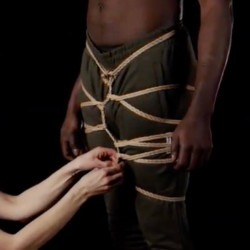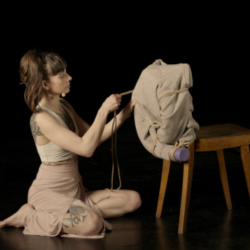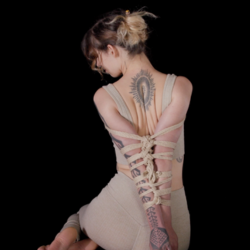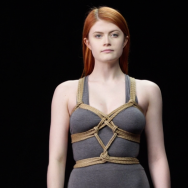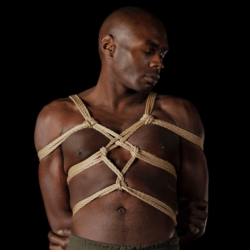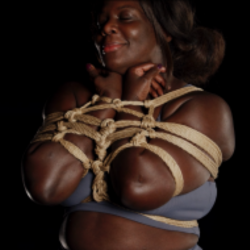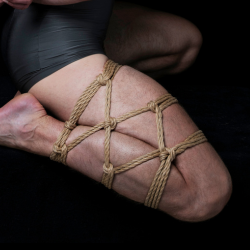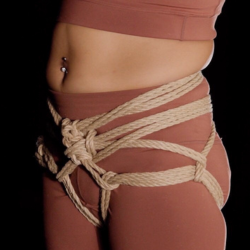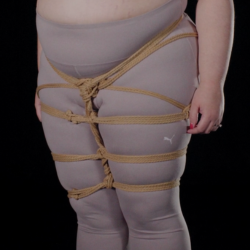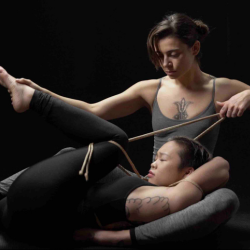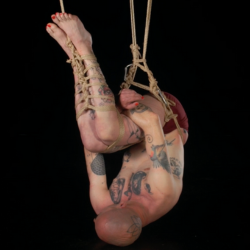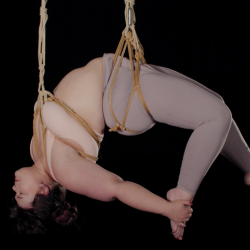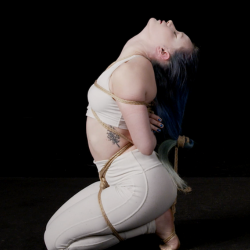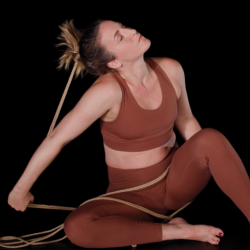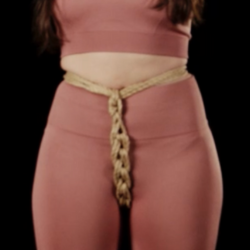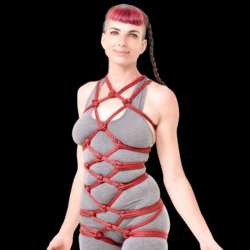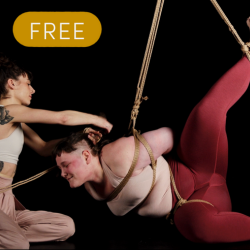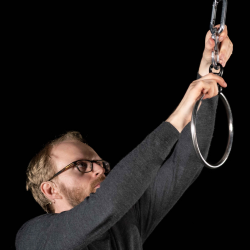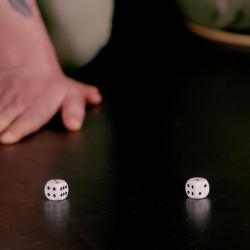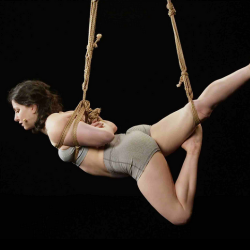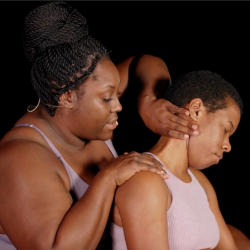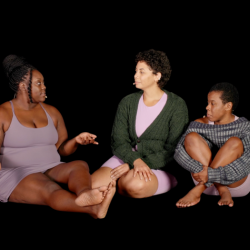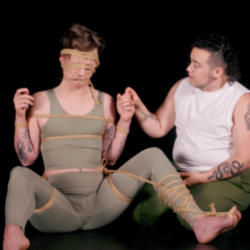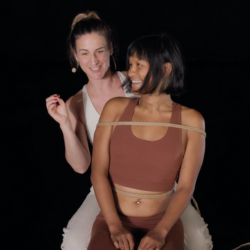EP 17
DK BLACKFISH
DK Blackfish shares how they embraced their identity inspired by the documentary "Blackfish" and discusses their rope journey. Their bottom-up approach includes models reaching out to them and a trauma-informed negotiation process.

DK Blackfish, a.k.a., Blackfish Rope Works, is a non-binary, non-professional practitioner of the Japanese form of rope bondage since 2016, who has been personally instructed and influenced by various rope artists in the U.S. and in Japan. DK Blackfish has privately practiced rope bondage with dedicated partners to grow in the art form and experience the emotional bliss of tying up humans through private, lifestyle-sessions, and also through 'not-for-profit,' rope photography/videography, performance, and instruction. DK Blackfish, under the alias of Delilah Knotty, previously modeled in the western form of rope bondage photography since the early 2000's, depicting the traditional motif of the 'damsel in distress' in on-line websites and once printed magazines like Harmony Concepts. It has always been their dream through rope bondage expression, practice, and out-reach for over 20 years, to see the rope bondage community grow to what it is today.
Wicked Wren [00:00:08] Welcome to the Shibari Study podcast. I'm Wicked Wren and today, I'm speaking to my friend Delilah. They are a rope artist with an everlasting enthusiasm to expand rope's influence in the world. Hello, Delilah. How are you?
DK Blackfish [00:00:23] Hi Wren, I'm very well. Pleasure to be here.
Wicked Wren [00:00:27] Yay. So you've been involved in rope for a while?
DK Blackfish [00:00:30] Yes, for, for a long time.
Wicked Wren [00:00:32] How did you find rope? What appealed to you about it?
DK Blackfish [00:00:36] Well, I am a – rope is, you know, is a beautiful art in itself. And I love to see people tied up. I mean, it's very (…). And I got into it because I used to buy magazines back in the late 90s and the Western-style rope was like kind of a very interesting take on tying people because it really just emphasized like a damsel in distress scenario. And that was just very beautiful to me.
Wicked Wren [00:01:02] Do you still have those magazines?
DK Blackfish [00:01:04] I have a couple. I have kept a couple.
Wicked Wren [00:01:07] That's so cool.
DK Blackfish [00:01:08] Yeah. Yeah, they're, they're old school and kind of hard to find nowadays.
Wicked Wren [00:01:12] Yeah, you should maybe like get them framed or something. That'll be really cool to see.
DK Blackfish [00:01:16] Yeah, I've thought of doing that for a couple. You know, one day I might do that.
Wicked Wren [00:01:20] Yeah. You do the damsel in distress motif often?
DK Blackfish [00:01:26] Yes, I used to do that a lot more, and I kind of got back into it recently, just for fun, just to show something different on social media because what we see most of the time now is like the Japanese-style of rope, but like, yeah, I brought it back. And wanted to show a little bit more like this kind of rope with cotton, with white cotton rope. Yeah, and that's how it was in the, in the early 2000s when I started in rope.
Wicked Wren [00:01:50] Wow. And why did you take a break from that? You know, why did you kind of get away from it for a bit?
DK Blackfish [00:01:58] Well, in the early 2000, I was doing a lot of bondage modeling and I was shooting photography with a friend. And it was it, was great. You know, I just love doing it. It's so exciting just to be tied up and also the tie someone. I did take a break because of personal reasons in the late, early 2000s. Actually, I had children and so I stopped and then I kind of got back into it because, you know, us in rope, we just can't stop tying.
Wicked Wren [00:02:24] Yeah.
DK Blackfish [00:02:25] And I got into it again, like in 2011 through 2015, and I was starting to do more Western-style rope.
Wicked Wren [00:02:34] Gotcha. Yeah, we don't have to talk about this part, but I think it would be cool to talk about you having kids and being (…). Would you want to talk about that at all?
DK Blackfish [00:02:44] Yeah, I can talk about that. Yeah. My, you know, having family, just like many of us, we have families and, you know, (…) is part of our lifestyle. And you just integrate (…) within the family matrix, really, and you just learn how to kind of balance that without like necessarily exposing them to it, you know? And until they get older.
Wicked Wren [00:03:06] Do your kids know that you're (…) now?
DK Blackfish [00:03:09] Yes, they do. They do. They definitely know. They, they've seen my rig at home. They've never really, they've never seen me tie anybody. But they definitely follow me on Instagram. Because they, I gave them a sticker from my friend katiekillsyou and they were like, Oh. And they found Katie and then they found me on Instagram.
Wicked Wren [00:03:30] They were like, This person looks familiar.
DK Blackfish [00:03:32] Yeah.
Wicked Wren [00:03:33] Were you nervous to come out to your kids and tell them that you were (…)?
DK Blackfish [00:03:37] You know, they actually approached me and it was right around here at the beach. They were like, Hey, we want to talk to you about what you do and we kind of know. I told them, I said, you know, I tie up people and they were like, okay, that's good. That's, that's enough. But they, you know, now they kind of think it's kind of cool.
Wicked Wren [00:03:55] I bet that a lot of people are nervous to tell their kids that they're (…) and things like that.
DK Blackfish [00:04:00] Oh, most definitely. You know, I think mainly they're just worried about their friends, their kids, their kids' friends and their families finding out. So, yeah, that's where I try to keep it kind of a closed door on that situation.
Wicked Wren [00:04:13] Yeah.
DK Blackfish [00:04:14] But I think they tell everybody, you know kids, they talk.
Wicked Wren [00:04:18] They do. And also the acceptance with rope bondage and things has really come a long way.
DK Blackfish [00:04:24] It has, I believe it has. At least, you know, I'm a little bit jaded because I do this and our community is all centered about rope. It's my lifestyle. But, you know, you see it on Instagram, you see it on social media, you see rope and in videos. And it's becoming a (…) new thing. And people really enjoy it. It's, I mean, bondage has always been a part of our life. It's been in movies, you know, it's always been kind of like an underlying theme. But yeah, social media really changed the game on this, I think.
Wicked Wren [00:04:58] Agreed. I literally just did a podcast and I talked about how latex is coming into fashion now, like in high fashion. It's people wearing latex to the Grammys and things like that. And that really wasn't a thing as like it is now.
DK Blackfish [00:05:12] No, I know. And they're wearing like strappy kind of like underwear or strappy bras. And just all of that has a very strong undertone of (…) and (…).
Wicked Wren [00:05:22] Yeah, there's a brand. I forget the name of the brand, but they make lingerie and they had some lingerie where they sewed in some dollar bills. And then a couple stripper friends of mine reposted that and was like, They want to be us so bad but they hate us in a way. And I think that there's this bad part right now where everyone wants to be a (…) worker, everyone wants to be (…), everyone wants to put themselves out there. They don't realize like the repercussions of actually doing these things, right?
DK Blackfish [00:05:54] Yeah. Socially, it may seem like it's being more accepted. It is on social media, but we still need to make – be active in this and sharing this and making it normal.
Wicked Wren [00:06:04] Yeah. I remember when I saw you on the like Thriller series on Netflix and the character Joe got tied up. Anyway, he was in like a hog tie and I immediately was like, Who did that? Because it was actually like, not bad rope and I was like –
DK Blackfish [00:06:21] Yeah, I love seeing stuff like that. Because you are so curious and you know, really secretly get off and I, I troll for things like that.
Wicked Wren [00:06:28] Yeah, me too. Me too. So you recently did a project and I've only seen this on your social. I don't know much about it. It was called Opera Unbound, right?
DK Blackfish [00:06:38] Yeah, it was Unbound. It was a (…)-immersive opera in Palm Springs. And it was all gay male, you know, opera singers that were centered around actually about centered around shibari. So I had to teach these singers how to do like a very, very basic suspension in such a phenomenal short time. The run-up was like less than a month.
Wicked Wren [00:07:05] Wow.
DK Blackfish [00:07:06] It was intense but it was a really good experience.
Wicked Wren [00:07:08] And for people that don't know, Palm Springs is a historically very gay area of California.
DK Blackfish [00:07:15] It's very gay and it's really just dominated by, you know, older, in fact, older gay community there. And it was interesting why they brought that there because (…), you know, it is a part of the gay community, but not shibari and rope art itself. So the producer brought this (…) opera there to try to like kind of expand the whole thing about shibari in that community.
Wicked Wren [00:07:42] So you said that you had to bring people up to proficiency very quickly.
DK Blackfish [00:07:46] Yes. Yes, I did.
Wicked Wren [00:07:47] How did you approach that?
DK Blackfish [00:07:49] That was, you know, I had a lot of ambivalence on that at first. And so I, with some hesitation and thought, I said, Okay, I'm going to do this. And I just told them immediately right off the bat like, There are serious risks to this. I almost like scared them off, you know. And they were like, We still want to do this, you know? So like, okay. So I taught them over a series of weekends. Maybe we spent about 20 hours learning like just basic tying and then a suspension.
Wicked Wren [00:08:19] Wow.
DK Blackfish [00:08:20] And I did this by like module. So we did five – like the first day was like a basic tie. And this second day was like, Okay, now we're going to start tying the chests, you know? And they started learning that and they were building the rig inside the director's house at the same time. So day three, we actually did a suspension and, you know, they were really surprised at how difficult it was.
Wicked Wren [00:08:47] Yeah. How many different elements of (…) were in this opera?
DK Blackfish [00:08:51] You know, there were a couple of people. And that's a really good question because I got really serious when I started teaching them. I started teaching them how to play, how to get into somebody's head and like, how to really make this opera like not just like a singing thing but I wanted that seemed to be authentic because they were new to rope. But some of them were into (…) and so they kind of understood. So there's a difference in acting. One is a called, you know, like I think method acting and then one is kind of like natural acting, right? And we had an experience and I'm not going to say who was, but one of them really – they all started doing the method acting and I actually got into the headspace of one of them. But one of the actors was like, they actually broke down. They actually had a whole pause. It was like a drama scene. And to their credit, they, they said, Hey, this is not really what I bought into this part. This is like, this is an opera. This is a theatrical experience. It's not real. So it became such an interesting learning experience because I had no idea that while I was actually going to teach people like how to actually play and do something that was authentic, that it would actually trigger somebody on an emotional level. Yeah, it was intense.
Wicked Wren [00:10:07] Do you feel like the people that were in the opera took these things into their own (…) play after? Do you think of this kind of informed their other (…) disciplines?
DK Blackfish [00:10:18] I think for a few, for sure. There's definitely a few in there that really enjoyed it and like to learn what I was teaching them. I think the producer, they really loved it. You know, they were really into it.
Wicked Wren [00:10:32] Was this one of the first times you've done something this quickly, bringing people from zero to like 100 so quick?
DK Blackfish [00:10:39] Yeah, I've never done anything like that. And I think most people in the community would be like, You can't do that, right? There's so many people who say you can't do suspensions for like six months or nine months. They were doing it in a month, you know, But I thought it could be done. I mean, the thing is, actors learn so quickly. They learn the lines and they learn how to sing and do their, do their thing. I thought they could be adaptive and they did pick up on it quite quickly.
Wicked Wren [00:11:02] Yeah, well, that was my next question was that a lot of people would say that's too quick. You know, a lot of them.
DK Blackfish [00:11:09] Yeah. But, but they're, they're adaptive. They can kind of learn quickly and they were kind of already in the (…) scene. It was like a – and we spent a lot of time learning this, you know, five-hour blocks.
Wicked Wren [00:11:22] Yeah. You kind of got the perfect setup of person to learn this. Like an actor that was fluent in (…) knows about, you know, risk. Knows about different things like that and then also in the situation where you're there 100% of the time that they're actually in rope. So you can help mitigate, right.
DK Blackfish [00:11:43] Like I was there, I was watching and, you know, I taught them all the safety measures, you know, use shears and if you need to and all the other issues, particularly with the arms and wrists for tying people. Yeah, they, they did very good. And in the end, the show was very successful. I mean they ran through and people really enjoyed it.
Wicked Wren [00:12:04] Do you have any big takeaways that you've learned from that? I mean, you did something super unique. I don't know if anyone else has done something like that like –
DK Blackfish [00:12:13] Well, I mean, I learned so much about Palm Springs in the gay community, right? And LGBTQ community, how those don't exactly mesh completely. And then also about like how to teach people that are learning and how to like, really recognize that, you know, there are different ways to teach people. And the takeaway was like, I can have a serious impact on somebody's mental ability or capability while you're teaching them. And it was just – it was kind of like a mine. I hit a mine on that. It was beautiful in one sense, but very, very dangerous. Yeah.
Wicked Wren [00:12:47] Yeah. Do you think that that informed your play coming back home?
DK Blackfish [00:12:52] It did. It did. Especially, if for me to be teaching because I do want to get more into teaching and personally and just small classes if I can. And it definitely gives me perspective. It gave me a perspective, yeah.
Wicked Wren [00:13:06] How do you approach sessions? Because I see online you do things that are obviously photo rope, but they're artistic. The goal seems to be amazing pictures.
DK Blackfish [00:13:19] Right? Yes.
Wicked Wren [00:13:20] And it also feels like you have things that are play-based and where you maybe, you're just grabbing a quick picture or something like that. How do you approach those two things?
DK Blackfish [00:13:28] Right. Right. Yeah, they're totally different, right? Like in, in like – I'll start with the play sessions, right? How do I approach that? So the play session is, you know, those are very unique and, and they're connective type of rope that people say and it's intimate, you know. It's not in terms of (…) but it's like between two people when you tie, there is intimacy there. I approach it in a way in a very safe manner and I try to practice what they're looking for. And I tie and we tie together and in a way that's very communicative and embodied and cathartic, if you will. And it's a very beautiful thing. And when I take a picture of those moments, you know, of course, with their permission, it's like you've got to break away from the scene to take it, you know? But, you know, I know how to take a photo for Instagram, right? You know, like, I've done this so long, it's like, hey, I need this for the gram. And they want it to. Yeah.
Wicked Wren [00:14:25] Well, so much of the community is on Instagram. You know, so much of like, so much of everybody's is represented through Instagram.
DK Blackfish [00:14:34] It is.
Wicked Wren [00:14:35] I think that's a better way of saying that.
DK Blackfish [00:14:35] Yeah, Instagram is, is the social medium for I think rope.
Wicked Wren [00:14:40] It seems like your play sessions are – you're kind of capturing a moment in time with that and then with photography and like art. How are you approaching that?
DK Blackfish [00:14:48] Yeah, for photography and art is it – that is like just a lot of fun. I love to do that. It's a great thing to do. I've always done it, you know, for years. I approach it in a collaborative effort. Usually, I don't get paid for anything that I do. In fact, I try not to get paid because it allows me the ability to be very creative. So I collaborate with models and photographers and then we'll get a studio or shoot outside and we'll just create something together, sometimes very much on the fly, but very, very, very aesthetically pleasing type of tie so that it can be shown on Instagram. And now I get taken down, but also, you know, spread the word how beautiful bondage can be. And, you know, people really resonate with that kind of thing. It's such a powerful actually conveyance of rope bondage through social media. And, you know, I've gotten comments from all kinds of people on this. Not even in rope but they just like to see it.
Wicked Wren [00:15:49] Was there a time where you felt scared or nervous to share your art?
DK Blackfish [00:15:57] Oh, that is such a big question. Yes, I have. It was interesting. In 2016 or so, I finally got comfortable with myself in rope and actually tying. For years, I've always was worried about what were the social implications of showing myself tied up or tying people because, you know, it's socially accepted in some realms, but generally not in our realms. Yeah, yeah. It's, there is a growth and curve on that. And to, to this day now, I'm fine. You know, there's not a second that I think about whether if I get outed or something or someone says something that I would feel shame about it because this is my lifestyle and I'm a strong advocate for it and I just want it to be accepted and less marginalized. But yeah, there was definitely a time and I'm sure there is there are others out there.
Wicked Wren [00:16:48] How did you get over that fear? Like, was there an inciting incident that kind of pushed you? Something you heard? Something like that?
DK Blackfish [00:16:56] You know, I don't think there was. I think it was just that one day, I just became very comfortable with that. I was just like, Hey, you know, I – this is who I am. I'm Delilah. Delilah Naughty or D.K. Blackfish, you know. And I got really comfortable with that.
Wicked Wren [00:17:11] Where did Blackfish come from?
DK Blackfish [00:17:14] That's a great question. I love that. You know, thank you for asking. So Blackfish and I deliberately took this name. You know, so the movie Blackfish, right? You were saying that about the killer whales, right? I saw that movie and I resonated with that movie. I was like, Oh my God, you know, here are these killer whales. They're apex animals, and they're being captured and, and being made to do these tricks. And they're– and I thought, Oh, that I kind of felt like that like as a bondage model that I was like being captured and being shown to do things, you know, basically take photos and show it online. And also, they're very apex. I mean, the top of the food chain, right? And I kind of look at myself like that, especially when it comes to tying as a top. And so I thought it'd just all work together. So I was like, Blackfish is going to be my new performance name and I took it up around 2015. Yeah. You know, the thing is, is that with something like that, you really got to look long term because I knew I've been, you know, I've been in this scene for so many years, and you – the one thing you do know is that you get recognition with Google after about five or ten years, right? So I knew if I took it up in 2015, maybe five or six years later, it would become more of like my pseudonym. And it happened.
Wicked Wren [00:18:34] Wow. Yeah, I've always been curious about that. That's such a cool story, you know?
DK Blackfish [00:18:38] And it's like, you know, sometimes people identify with like, an animal, an animal persona, you know like, you know, some people say they're a bird or some people they're a fox. You know, I say I'm like a killer whale because I am a top. Yeah, I'm a RoboCop, you know.
Wicked Wren [00:18:55] Do you have any killer whale-like art or like a stuffy or anything like that?
DK Blackfish [00:19:00] I have a killer whale onesie that was given to me by my rope partner, and it's really cute.
Wicked Wren [00:19:05] I love that.
DK Blackfish [00:19:06] You know, my kids got a big kick out of it.
Wicked Wren [00:19:09] Do you tie in it?
DK Blackfish [00:19:11] I haven't yet. I don't know. You get really hot when you tie.
Wicked Wren [00:19:13] I was about to say that. Something I noticed that you do when you tie that I think is very cool, is that you'll put little piles of rope around places and also carabiners around different places. And I've never seen someone do that.
DK Blackfish [00:19:26] Right? Yeah.
Wicked Wren [00:19:27] Yeah. So you don't have to like search for it or whatever.
DK Blackfish [00:19:29] I do that, you know, I can – I don't know where I'm going to be once I start tying. Sometimes I start on the edge of my, you know, my area or right in the center. It's nice to be able to grab those things without losing your partner. You know, like I try to stay close to them. So if I have to, like, move away from them to grab some rope or a carabiner, I'm kind of losing the connection.
Wicked Wren [00:19:50] Yeah.
DK Blackfish [00:19:51] So that's why I, it's strategic. I put them around so I can grab it.
Wicked Wren [00:19:55] It's such a simple fix for that, you know?
DK Blackfish [00:19:58] Yeah. Yeah.
Wicked Wren [00:19:59] Can you talk to me a little bit about your negotiation process or your intake process or tying with maybe new people and people you've consistently tied with?
DK Blackfish [00:20:09] Yeah, yeah. I'm happy to talk about that. My, my approach has always been that for the 95% of the time models or, or partners, they approach me. And that's kind of been my, that's been my approach to rope is to have a model approach me. And it usually either in person, if they've seen me perform with somebody or online. And that's part of the whole intake process because I feel safe, safer, if you will. I don't want to say it's completely safe, but if someone is approaching me, I don't appear to be – are looking as if I am like looking for a model or, you know, hunting for a model because I don't, I don't like that, that the way that looks and it, it definitely can be portrayed incorrectly like you're a predator trying to tie people.
Wicked Wren [00:21:01] It also does flip the power dynamic, right. It makes the model in a place of having to negotiate kind of up versus like someone coming to you and having full autonomy over that decision. Put you on equal playing field, Right? That's a really wise thing. Yeah.
DK Blackfish [00:21:20] It is a bottom-up kind of procedure, if you will. Like they come to me and then I'll open up the engagement and we usually talk and you know, we all talk either through text and I do zoom meetings beforehand. Frequently, I've met for coffee before we tie. It's very rare that I've actually just brought somebody into my house after like, Hey, let's tie, you know. That doesn't, that doesn't happen. You know, it's not safe in any way, I think.
Wicked Wren [00:21:46] And when you do a Zoom meeting, are you just kind of hanging out and just like seeing if you do vibe or do you have specific things that you want to ask?
DK Blackfish [00:21:53] Right. Yeah. It, it really is a vibe. Like they're going – when you look at each other, you kind of see. You can read each other and be like, Hey, I may like to be – tie that person. They look safe? And then, yeah, we talk about anything that they're comfortable with and what I'm comfortable with. Just how we're feeling and then we go into the real things about what we're looking for in rope.
Wicked Wren [00:22:12] Yeah. And how does the conversation around what you're looking for go usually?
DK Blackfish [00:22:16] I usually ask, you know, why did you approach me? What was it that you really liked that made you want to tie with me? And that will lead them into something either they want to look pretty or they like to be bound, or it looks very connective. And you know, I want a cool experience of some type and those and that can go into very different, different avenues of like discussion.
Wicked Wren [00:22:44] And then on your tying sessions, are you doing another round of maybe consent talk?
DK Blackfish [00:22:51] Yeah. So like there's always an early pre-negotiation I call it and then on the day of I always negotiate and I've learned this from a group here. In negotiations, it is like, you know, you're not going to be perfect at it. You ask a lot of key questions and ask questions about how they're feeling, what's going on with their day, do they have any injuries or, you know, they're aware of the risk to this. Also, other things that I really started to bring in are like trauma-informed kind of consent issues. And it's, it's really interesting because we all carry trauma and we get into rope in some ways to actually kind of heal selves there kind of or maybe numb it. But as a rigger, as a top, you know, you may actually accidentally step into that as you tie them. So I'm not asking them to tell me about their trauma. I'm just saying, Hey, you know, I know we carry trauma around. If, for instance, I actually trigger something, I ask that we actually be able to work through that together because I – it's not my intent to like bring out trauma. I want this to be a great, fun, loving experience or (…), you know?
Wicked Wren [00:23:59] But like you said, the avenue for bringing up past trauma is there. I think that the real issue comes in when people, you know, especially top say, I can heal that trauma, which is – I feel is very common unfortunately, right?
DK Blackfish [00:24:13] Yeah, I would be very wary of anybody who can say that. I'd be wary of a lot of key things like that. Especially, if they say they make it a safe environment or – that's like not possible.
Wicked Wren [00:24:22] Miss True Blue said something that was cool. She has – that Vox is a safer –
DK Blackfish [00:24:29] Safer.
Wicked Wren [00:24:30] Place. And I was like, That's a very cool thing because it'll never be safe, right?
DK Blackfish [00:24:35] Yeah, and that's true. And I totally, I totally agree with that. it is – you can make it a safer space. You could put in rules and designate certain persons to watch the environment. But, you know, you can't guarantee everything. You don't know what's going to happen. And, you know, even for people that are playing together for a long time, there's errors and mistakes.
Wicked Wren [00:24:57] Absolutely. Yeah, I find that even people that do have a long history should be talked about maybe sometimes more than people that are, that are new. You go in, you're like, Oh, this person's been doing this for a really long time. This person's got to be safe because they know what they're doing. And like, that should not be a key. Like, Oh, it's fine, you know, I'm going to be safe because this person's all over the Internet and this and that kind of thing.
DK Blackfish [00:25:22] Yeah, You know, that's a – oh, my God. There's so much to talk about. That in particular is a very important thing that I think about frequently because years of experience, people tend to kind of to look at as being like a proficiency or an expertise. And that doesn't mean anything. It just means that, yeah, maybe they are better at tying but that doesn't mean they are safer for you. They may not have, they may be perpetuating like bad types of rope for years and keep doing that just because they have a high follower count or years of practice or, you know, have beautiful studios. You know, you really have to be educated on this.
Wicked Wren [00:26:00] Yeah, yeah, yeah. There's so much turnover in what we do that it's difficult to have a track record like no one carries a resumé with them. You know, they can delete your screen name and make a new one.
DK Blackfish [00:26:13] Make a new one. You can change your – Oh my God, you can change your handle so easily and it's just like people can't find you. But in the community, it's so dispersed among in the country. You know, we have small little enclaves in big, major metropolises like, you know, San Diego or Los Angeles, San Francisco. But then it's all interspersed and across hundreds of miles. And how does a community like that self-regulate? You know, it's very, very difficult.
Wicked Wren [00:26:39] Yeah. I don't know.
DK Blackfish [00:26:40] Yeah. There's no real solution to it. It's a, a lot of people have used social media to call out, right. And that has backfired on some of them. And sometimes it has worked. In those cases, it's just become like noise, white noise. And, you know, it's a very difficult way to try to self-regulate. But we could all just kind of like spread the word out quietly about something and protect each other as we tie.
Wicked Wren [00:27:07] To call out things are hard because of the canceling thing because rope – I feel like is unique in (…) where it is people's lives.
DK Blackfish [00:27:17] Oh yeah.
Wicked Wren [00:27:18] So if someone gets canceled or whatever, they're not stopping rope. So instead it's like you've banished them and then they're going to make a new persona and then continue to harm versus calling someone in and saying like, Hey, this was messed up, whatever, whatever. But then that leads into the issue of like, Who is qualified to do that? You know, who's that person and it's not one person.
DK Blackfish [00:27:46] It isn't. It's a community.
Wicked Wren [00:27:47] Exactly.
DK Blackfish [00:27:48] And like, what is that community? You know, transformative justice is what you're kind of touching on to, try to heal that person. They have to be receptive to it. And, you know, they're not always ready to go through that. And they just want to – they'd rather just disappear or just kind of move to a new area and keep doing the same thing.
Wicked Wren [00:28:07] Yeah.
DK Blackfish [00:28:08] And you know, and what you're saying particularly about like who wants to do that or who has the qualifications for overseeing that it's – that's a real gray area.
Wicked Wren [00:28:18] Yeah. So what are you looking forward to? What do you – what's exciting?
DK Blackfish [00:28:23] Um, I really am looking forward to, I'm looking forward to rope post-pandemic. Although, I really took off in rope photography at that time and I enjoy photography. I'm going to continue with that. I've realized that I suspended it for a little bit but I want to go back to it. It, it is very creative for me and it keeps me very active. But I want to get into everything now. Like I'm going to get into a little bit of teaching, some small performances if I can, and just kind of keep, keep the ball rolling in all aspects of rope.
Wicked Wren [00:28:59] Why did you suspend the rope photography?
DK Blackfish [00:29:02] Um, I got, you know, it was interesting. I had like – rope photography, it really grew my Instagram account substantially, right? It really gave me a lot of credit. But rope photography is not like necessarily a real aspect of rope and how we tie and connect with people. Like, I wanted to show something that was more organic and real and stuff about play and show people that, Hey, this bondage what I do. It's not just like – I'm not just a rope photographer, a content creator, which I love to do, but I'm also like a rope, you know, I practice this as a lifestyle, you know. And so I wanted to get into that and I started showing it more and more and, you know, it kind of took off again with making reels. But I kind of, when I do a photo shoot with models and I'm at a studio and you're collaborating, it's so exciting.
Wicked Wren [00:29:53] Well, where can people find you?
DK Blackfish [00:29:57] Where they can find me? Yeah, you can find me on Instagram. You can find me on the Internet. My Instagram handle is @dk_blackfish. I'm also known as Delilah Naughty. That was kind of like my bondage-modeling persona back in the day. And by the way that Delilah Naughty, that DK that's how I got the abbreviation DK.
Wicked Wren [00:30:20] That's great. Amazing. Well, I want to thank you for being on. This is really amazing. I learned a lot.
DK Blackfish [00:30:26] Thank you. It's been a pleasure.
Wicked Wren [00:30:28] You're welcome.
Start your free 7-day trial
Get one free week of unlimited access at Shibari Study,
then pay from $17.90/month. Cancel anytime.


